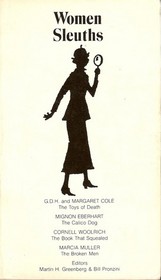Women Sleuths
Review by Matt B. (BuffaloSavage)
In the middle 1980s, Reader’s Digest issued a series titled Academy Mystery Novellas. Women Sleuths was the first, followed by Police Procedurals and Locked Room Puzzles. The editors, Martin Greenberg and Bill Pronzini (a mystery writer himself), choose stories that were too long for short story anthologies and too short to be published as stand-alones. Another plus is that they included capsule biographies of the authors.
The Toys of Death (1939): G. D. H. and Margaret Cole wrote almost 30 detective novels. They went along with the Golden Age conventions of complicated engines of death, English country house setting, a plethora of suspects, the intuitive amateur detective, obscure knowledge and the long reveal, this time in a letter written by the perp who has fled to Patagonia or some such wilderness. The rural setting is evocative in this, with an attractive writing style that is concise and vivid.
The Calico Dog (1934): It is odd that Mignon Eberhart (sounds like a character in a Perry Mason mystery) is a neglected writer now, since she had about the longest career of any American mystery writer (from the 1920s to the 1980s) and was known as the “American Agatha Christie.” This Golden Age story has a unique plot: two young men claim to be the same nephew who was kidnapped as a child. The sleuth, Miss Susan Dare, is hired by the aunt who must decide which one is the real one and thus inherit about 30 million mid-1930s dollars, about a bazillion dollars in today’s money. The story moves along briskly, has very fine settings, and is worth reading as a high society mystery.
The Book That Squealed (1939): Cornell Woolrich pokes genial fun at his heroine Prudence Roberts. She’s a young librarian who’s kind of a blur to men until she takes off her glasses. Then even hard-bitten police detectives start to feel all funny inside. Prudence gets involved in a serious crime with unhinged crooks during her own investigation after the police hoot at her warning that something bad is happening, or will happen at a remote house. Woolrich, to my mind, is much better in short stories than in novels, which I find overwrought and shrill.
The Broken Men (1985): I’d not read a Sharon McCone story by Marcia Muller in about 25 years so this really brought back the 1980s for me: Chambray pants, Adidas running shoes, and overflowing ashtrays. McCone is hired as a bodyguard for two clowns at a show at a pavilion. It’s an easy job, of course, until the killing. Good use of flashback and past sins, a lazy horse named Whitefoot is funny, clowns are usually fun, and – O, my fur and whiskers! – her cat gives her the idea for the solution. Highly recommended.


